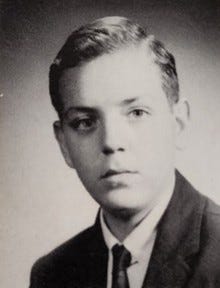“We must always tell what we see. Above all, and this is more difficult, we must always see what we see.” Charles Péguy
This article will be different because I’d like to take some time to explain why I’m writing these articles and why they may strike some people as annoying, controversial, or just plain wrong. You are certainly free to come to those conclusions. As the preacher man said, “You can disagree with me. You have the right to be wrong!”
As I will detail below, there was a time when I was young, naïve, and willing to go along with what the general crowd accepted. My high school yearbook photo shows me as a conventional young man.
I will describe my history and the change in my views over time below. I saw the Péguy quote above, and it struck me. It is easier and safer to pretend we don’t see what’s in front of us. To act as if it doesn’t matter when policy choices hurt large groups of people or lies of commission or omission cause damage.
For various reasons, I have always felt like an outsider. I had multiple illnesses and surgeries as a child. Then, I was a child actor, often in plays where I was the only juvenile in the cast. I feel myself an observer in life more than “one of the guys.”
Let me be clear. I am not bitter. My articles are not a “call to arms” or a manifesto. Instead, they are written in sadness and with a feeling of spitting into a hurricane.
Thomas Sowell wrote about a self-anointed group ruling over the benighted. They never listen because they never doubt their wisdom or righteousness. They seem determined to continue their actions despite the building anger, frustration, and resistance in the general public.
They won’t listen to an almost octogenarian writing a weekly commentary. But I hope others will listen.
I write to inform, not inflame. Sadly, people who have heard only the other side for years will have trouble hearing this information as anything other than provocative.
- - -
I was part of the high school class of 1963. The world and I were very different then. Newspapers were a big deal with morning and evening editions. Many homes had only one black-and-white TV, and we watched the nightly news together. Most of us respected those in authority. It was the last summer of the Kennedy years. Some people wanted to “Impeach Earl Warren,” but they were considered outliers.
With my freshly minted diploma and the arrogance of a teenager, I sent a letter to the editor of the Baltimore Evening Sun, which I knew would solve the Civil Rights problem. The letter was printed. I felt good. It didn’t solve the problem.
During my high school years, the World War II correspondents were writing about the rise of Hitler. I was reading Alan Bullock and William Shirer and others. As an undergraduate, I had a broad education. I majored in Political Science and minored in Mathematics. I had the full menu of “101” classes in almost every hard science and social science.
When Lyndon Johnson was President, I was an editor of my college newspaper and frequently wrote a column. On a few occasions over the years, I have had columns and letters to the editor published. After college, I worked in the computer field. I have followed politics and foreign affairs because of my undergraduate major and as an interested citizen and voter. I’ve also read a lot on various subjects in books and columns.
The last sixty years have been very troubling. Most professional fields have been captured by people with agendas instead of those dedicated to the essential purpose of their professions.
More troubling, the most essential freedom is being challenged – Freedom of Speech. The reason is apparent. If I am going to abuse the powers “appertaining” to my office, I don’t want anyone to be able to complain about it. Their complaint must be “misinformation. Even better if I can claim victim status, I can accuse them of a larger “sin” and avoid the primary discussion altogether.
The New York Times produced a scandalous text claiming that in a world where slavery was universal and religious freedom was rare, the United States was colonized by people searching for a haven for slavery. That is an absurd lie and a slander. Yet the University of North Carolina faculty wanted to have its author join them.
To “save democracy,” courts and politicians are trying to limit or keep the public from voting to express their desire for a policy change. Courts have blocked Marine Le Pen in France and Călin Georgescu in Romania from running for office. The International Criminal Court indicted Bibi Netanyahu. Israeli courts are trying to convict him for various things to get him out of office. I discussed the Trump Lawfare fiasco in a previous column.
Robert Bryce has written about the inverse relationship between energy and poverty. There is a YouTube video of a talk he gave that is embarrassing to anyone who claims to care about the state of women yet insists on limiting the electrification of the poor parts of the world.
These are a few of the things I will be discussing. I also promise to throw in some bad “Dad jokes” occasionally.
Thank you for letting me explain myself.

